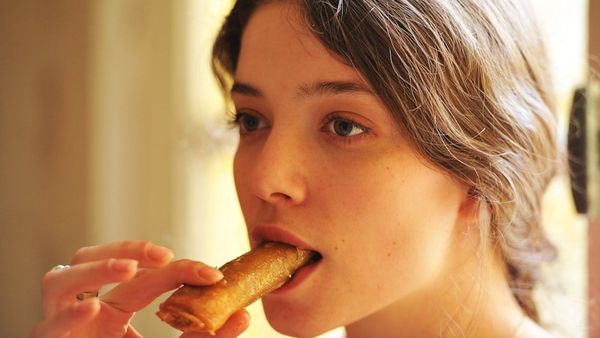Eye For Film >> Movies >> Honey Cigar (2020) Film Review
Honey Cigar
Reviewed by: Amber Wilkinson

The push and pull of cultural heritage is married to coming-of-age in Nineties France in Kamir Aïnouz's feature debut, which while getting to the heart of young desire struggles to fully integrate its political themes.
"You're Algerian?" says one of the admissions interviewers at the college that 17-year-old Selma (Zoé Adjani) wants to attend, "It doesn't show", the first of many references to both an inherent prejudice in French society and to the way that some things can resonate deeply even if they are not visible on the surface.
"I'm double," says Selma, who was raised in an upper middle-class French household although her parents are both Algerian, although, a better term might be "split" - as just as she begins to explore her sexuality and self-determination, she begins to be steered down a different path by her overbearing mum (Amira Casar) and overprotective father (Lyès Salem), who though secular and vocally declaring opposition to arranged marriage, are nudging her none too subtly in a particular direction.
Aïnouz has a feel for the heat and lust of youth, framing elements of the film with voiceover reciting the erotic encounters of Scheherezade, the sensuality thrumming through Selma at the thought. When she meets self-assured Julien (Louis Peres) the two embark in a verbal sparring match that permits her to sound a lot more worldly that she is and, if Julien is a bit one note, the pair's chemistry is palpable and Aïnouz gives Selma plenty of agency as she literally takes the breaking of her hymen into her own hands. Aïnouz is at her best in the moment with Selma, whether it's when she's lost in erotic thought at the beach, during first go at sex or gazing at herself in the mirror - when, in a nod to how body conscious teenagers can be, the one thing that she can't see reflected is her face.
Less successful is the building of the relationship with Selma's parents. It's clear they too are, in some ways, at cross-purposes with their cultural heritage, proudly secular yet still drawn to the idea of marrying Selma off to a nice guy - someone who turns out to be anything but in a sequence whose aftermath is dealt with somewhat perfunctorily, considering its impact.
Aïnouz also struggles to successfully build the fabric of the triangle between child and parents because almost every scene between the three hinges on high emotion - a late-stage, more relaxed piece of filming showing the women of the family bonding over the making of the honey cigars of the film's title a hint at what might have been. Whenever the director opts for the more matter-of-fact, naturalistic approach it works for her, with the action less successful when she tries to push the emotion - something the score by Julie Roué is particularly guilty of.
She particularly succeeds in the film's more subtle moments, the way, for example she shows insidious encroachment of the patriarchy in everyday life, whether it's Julien feeling its okay to immediately reference Selma's boobs, her father's preferred suitor Luka (Idir Chender) having no regard for consent or a hazing that requires her to pretend she's having sex.
By attempting to incorporate elements of the Islamic unrest in 1993/94 Algeria, Aïnouz also bites off slightly more than she can chew - she may want to use the backdrop to shore up the ideas of feminism versus the patriarchy but the strength of her film lies not in the broader sweep but in the intimate, well-drawn moments of exploration, discovery and self-determination with Selma. We don't always need the bigger picture to appreciate a finely worked single portrait.
Reviewed on: 14 Apr 2021















